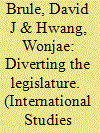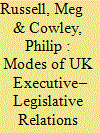| Srl | Item |
| 1 |
ID:
096689


|
|
|
|
|
| Publication |
2010.
|
| Summary/Abstract |
Given distinct partisan macroeconomic preferences, the partisanship of the president or majority in Congress should influence presidential decisions to use force in the face of poor economic conditions-the diversionary use of force. But previous research posits contradictory accounts of the influence of partisanship. We seek to resolve this debate by developing a game theory model, which predicts that leaders divert when government is divided and economic conditions hurt the opposition party's constituency. Leaders seek to divert the legislature from the economy in order to prevent the legislature from passing a remedial economic bill. Analyzing US conflict behavior since World War II, we examine the conditional influence of presidential partisanship and the president's cohesive partisan support in Congress on the effects of inflation and unemployment. Consistent with the model's predictions, we find that as their cohesive partisan support in Congress declines, Democratic presidents tend to use force in response to inflation and Republican presidents tend to use force in response to unemployment.
|
|
|
|
|
|
|
|
|
|
|
|
|
|
|
|
| 2 |
ID:
161659


|
|
|
|
|
| Summary/Abstract |
Anthony King's 1976 article ‘Modes of executive–legislative relations: Great Britain, France and West Germany’ is a classic in legislative studies. It argued that it is simplistic to analyse relations between ‘the executive’ and ‘the legislature’ in parliamentary systems, because parliaments are complex organisations comprised of competing actors. Instead, we must consider the various ‘modes’ through which these actors can interact to challenge the executive. As King pointed out, the classic view of the British Parliament was of a dominant ‘opposition mode’ and yet, in fact, the most important relationship was the ‘intraparty mode’: between the government and its own backbenchers. Other options, such as the ‘non‐party mode’ or ‘cross‐party mode’ were considered weak in Britain. This article revisits King's modes in the light of changes at Westminster during the intervening forty years. Developments such as the establishment of the select committee system and a more confident and party‐balanced House of Lords require significant changes to his conclusions. But his central insights, encouraging readers to focus on the multiple relationships inside legislatures, including those within political parties, remain fundamentally important.
|
|
|
|
|
|
|
|
|
|
|
|
|
|
|
|